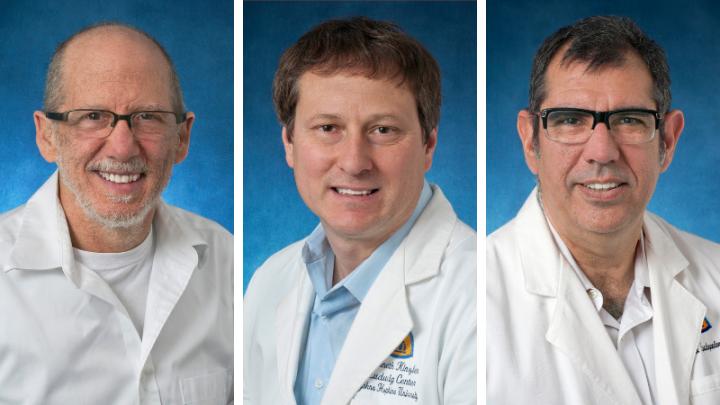New health care company, Thrive, licenses CancerSEEK, a DNA- and protein-based liquid biopsy test

Credit: Johns Hopkins Medicine
A pioneering blood test developed by Johns Hopkins researchers that incorporates earlier cancer detection into routine medical care will be developed by a new company that has raised the largest outside investment ever by a licensee of a Johns Hopkins technology.
CancerSEEK, a liquid biopsy test designed to detect multiple cancer types at earlier stages of the disease, will be developed by Thrive.EarlierDetection Corp., a new company that launched today with $110 million in Series A funding. Thrive will have offices in Massachusetts and Baltimore and will conduct its research and development at the 1812 Ashland building, part of Johns Hopkins’ innovation hub on the East Baltimore campus. Third Rock Ventures, a Boston-based health care venture firm, led the financing.
Alongside the CancerSEEK technology, Johns Hopkins also has licensed to Thrive a foundational DNA sequencing technology, Safe-SeqS, and a suite of supporting biomarker technologies.
“This is a milestone moment in the development of Johns Hopkins’ biotech ecosystem,” said Christy Wyskiel, head of Johns Hopkins Technology Ventures, the division of the university which licenses technology and supports university startups. “Johns Hopkins researchers are at the forefront of advancements in cancer screening technology, making Baltimore fertile ground for the commercialization of these discoveries into products that revolutionize health care.”
CancerSEEK interrogates genomic mutations in circulating tumor DNA (ctDNA) and cancer-associated protein markers in plasma to identify abnormalities that are common across multiple cancers. CancerSEEK has received Breakthrough Device designation from the U.S. Food and Drug Administration (FDA) for the detection of genetic mutations and proteins associated with pancreatic and ovarian cancers.
In a retrospective study of multiple cancer types published in Science in 2018, CancerSEEK was shown to perform with greater than 99% specificity and with sensitivities ranging from 69% to 98% for the detection of five cancer types – ovarian, liver, stomach, pancreas and esophageal – for which there are no screening tests available for average-risk individuals.
To complement colonoscopy, mammography and other screening tools, CancerSEEK is designed to be used in routine medical care, with the goal of identifying multiple cancer types at earlier stages. To support physicians and patients in acting upon the results of the test, Thrive aims to offer an integrated service that provides support in result interpretation, confirmatory diagnostic testing and guidance for additional clinical care where appropriate.
“Over the past 30 years we have made great strides in understanding how cancer works. Now, by combining this knowledge with the latest in molecular testing technologies, it has been possible to develop a simple blood test for the detection of many cancers at relatively early stages,” said Bert Vogelstein, Clayton Professor of Oncology in the Johns Hopkins Sidney Kimmel Comprehensive Cancer Center, investigator at the Howard Hughes Medical Institute and co-director of the Ludwig Center at Johns Hopkins one of the inventors of CancerSEEK and Thrive’s scientific co-founder. “We envision a future where routine preventive care includes a blood test for cancer, just as patients are now routinely tested for early stages of heart disease. Such testing does not have to be a scary, expensive, or complicated process. We know that if cancer is caught early enough, it often can be cured.”
Other inventors of CancerSEEK from the Kimmel Cancer Center include Kenneth W. Kinzler, a professor of oncology and co-director of the Ludwig Center with Vogelstein; and Nickolas Papadopoulos, an expert in cancer diagnostics and professor of oncology and pathology. Kinzler, Papadopolous and Vogelstein are among the founders of Personal Genome Diagnostics (PGDx), another Johns Hopkins spinoff that provides advanced genome testing products and services.
“The Johns Hopkins Sidney Kimmel Comprehensive Cancer Center has been a leader in cancer research and treatment for more than 45 years,” said Paul Rothman, CEO of Johns Hopkins Medicine and vice president for medicine of The Johns Hopkins University. “I am excited to see the work of our researchers has been affirmed by this opportunity, which hopefully will lead to more breakthroughs in cancer care.”
A prospective study of CancerSEEK in healthy individuals, the DETECT study, is already underway to better understand its performance and how to implement its findings in patient care. The study is led by investigators at the Johns Hopkins University School of Medicine, in partnership with Geisinger and Thrive. Study enrollment is complete and the data are being analyzed.
###
Conflict of Interest. Under the terms of a license agreement between The Johns Hopkins University and Thrive, the university and Vogelstein, Kinzler and Papadopoulos are entitled to a share of royalties on future sales of products sold by Thrive. The Johns Hopkins University and Vogelstein, Kinzler and Papadopoulos also own equity in Thrive.
Media Contact
Amy Mone
[email protected]
Original Source
https:/




